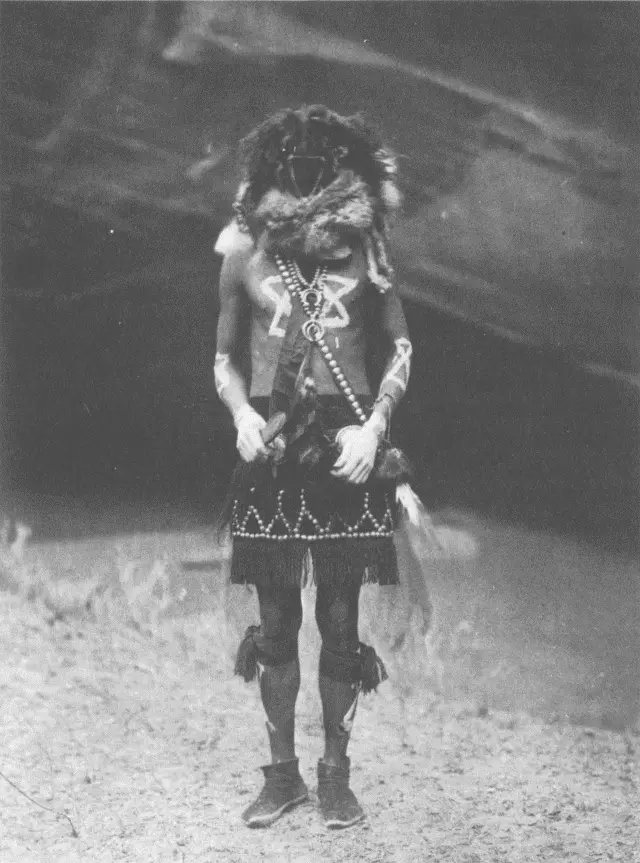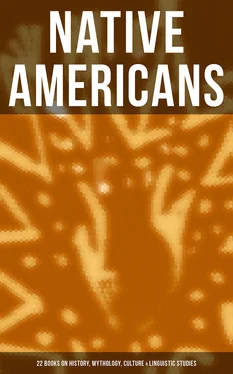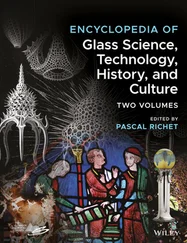Then the Dĭgí̆n took their departure, vanishing the people knew not whither. Yólkai Ĕstsán turned westward to her whiteshell home on the horizon, far out across the wide waters. Arriving there she determined to make a few more people. Cuticle rubbed from her body, with bits of white shell, turquoise, abalone, and jet, she placed between two sacred deerskins, male and female, and called for the Spirit Winds of the east, the Spirit Winds of the west, Hasché̆ltĭ and Haschógan, who came and breathed upon and tapped the deerskins as once before, and lo! there arose four pairs of people.
Each pair was given a walking-stick—one of white shell to one, staffs of turquoise, abalone, and jet respectively to the others. Black Fog and Black Cloud came and spread out over the water. Upon these the new people took up their journey eastward to join others like themselves. For four days they travelled on Fog and Cloud, reaching the earth at the end of the fourth day, where, on the following day, they were welcomed by Chĕhonaái, the Sun. There, too, the Bear, the Wolf, the Great Snake, the Mountain Lion, the Weasel, and the Porcupine met them at the direction of Yólkai Ĕstsán, to guard them on their long land journey. The Lightning also she made, to protect them from above.
They journeyed eastward, stopping to camp and rest at the end of the first day. For water they had but to prod the earth with their walking-sticks and a spring gushed forth. The first of the four, the man of White Shell, stuck his staff into the ground and water came up at once. "The water is close," he remarked, from which speech he took his name, for the others henceforth called him To Ahánĭ, Water Is Close. The following night the Turquoise Woman brought water, but it was bitter, so she said, from which fact she took her name of To Dĭchínĭ, Bitter Water. The man who tried for water on the third night found only a muddy flow, so the others called him Hashklí̆shnĭ, Mud. The fourth night they camped in sight of the Dĭné̆ (Navaho) whom they had come to join. The woman of the fourth pair called attention to the houses in the caves, after which they called her Kí̆nya Ánĭ, Houses in the Cliffs. 7
The following day they were welcomed by the twelve who had been created and given dominion over the land but a short time before, and from these twenty have the pure-blood Navaho descended.
Table of Contents

Nayé̆nĕzganĭ - Navaho
Two of the most important characters in Navaho mythology are twin miracle-performing sons of White-Shell Woman, Yólkai Ĕstsán, chief goddess. This plate pictures the leader of the two—the first conceived and the first-born, whose father is the sun. His name means "Slayer of Alien Gods," from aná, alien; ye, gods; agánĭ, to kill. By him, with the assistance of Tobadzĭschí̆nĭ, his twin brother, were killed numerous bird, animal, rock, and human monsters, typifying evils, who wantonly destroyed human life.
When the Spirit People came upon this earth from below they made six sacred mountains, four on the distant horizon at the cardinal points and two in the centre, Chóĭli and Tzĭlhnúhodĭíhlĭ. On the eastern slope of Chóĭli, brought forth as the daughter of Earth and Sky, was born Yólkai Estsán, White-Shell Woman. First Man took her to his home near Tzĭlhnúhodĭhlĭ, where she matured in twelve days into a beautiful woman with supernatural powers. Later she lived in a home of her own at the foot of this mountain. It was while there that she gave birth to twin boys who became saviours of their people, slaying alien gods who were fast depopulating the earth.
Yólkai Estsán would often lie on the eastern slope of the mountain as the sun rose through the morning, and when the day grew warm would seek the shade of jutting rocks from which trickled shining drops of water. Quite unknown to herself she had conceived one day from the sunbeams and the dripping water. When she became aware that she was to become a mother Yólkai Ĕstsán was made very happy, for she did not enjoy living alone. Soon she found herself the proud possessor of twin boys. The first-born and the stronger came to be known in his youth as Nayé̆nĕzganĭ, Slayer of Alien Gods; the other was always known as Tobadzĭschí̆nĭ, Born From Water. Their prenatal life covered a period of only twelve days, and maturity was attained in thirty-two days after passing through eight changes, one of which came every four days.
At that time the earth was infested with great giants, foreign gods, who were rapidly destroying the people. Of these, Yéĭtso, Big God, as large as a mountain, was the only one in human form. The others were Man-eating Bird, Rolling Stone, that crushed all in its path, Tracking Bear, and Antelope, who killed without mercy. Fearing lest some of these monsters learn of the presence of her boys, Yólkai Ĕstsán kept them hidden away on the mountain side, but they chafed under confinement, so she made them bows and arrows and let them play about, but admonished them not to stray far from home. The boys promised to obey, but not long afterward, because in reply to their questions their mother told them she did not know who their father was, they became sulky and broke their promise, going off toward the east. They would go and search for someone who knew. When on a small knoll a long way from home they heard a whispered "Sh-h."
"Are you afraid, my younger brother?" asked Nayé̆nĕzganĭ.
"No!" was the quick response.
Four times they heard the whisper, and then two of the Wind People appeared. "We saw you travelling eastward," said they, "and came to caution you. The land is cursed with alien gods who kill for pleasure; beware of them! Why do you journey thus alone without your father?"
"Our father! Alas, we know nothing of him and are now starting on a search to learn. Do you know who he is?" asked the boys.
"Yes, the Sun is your father; but if you think to find him you will have to travel far eastward and cross the wide, wide waters."
Nayé̆nĕzganĭ turned to his younger brother and said, "Sítsĭlĭ, let us go."
The Sun was then overhead. Being in fact of a holy nature, the boys covered distance rapidly and by mid-afternoon had passed well beyond the limits of their homeland. There they came upon an old woman sitting beside a ladder projecting from a hole. She asked them who they were and whither they were going. They told her to the Sun, whose sons they were, but whom they had never seen.

Tobadzĭschí̆nĭ - Navaho
This is Born From Water, the second of the twin miracle-performing sons of Yólkai Ĕstsán, the White-Shell Woman. His brother is Nayé̆nĕzganĭ.
"I pity you, my grandchildren," said the old woman; "come in here and rest a moment before going on." She started down the ladder and the boys followed. Twelve ladders were descended before her home was reached. The old woman was Spider Woman, the little grandmother who belonged to the Holy Ones. Her home was well kept, clean and comfortable, and the boys were glad to rest. Said she, "My grandchildren, your journey is long and many trials will beset you before you reach the end. Take these life feathers; they will help you; if difficulties befall you, use them," and she gave to each two feathers plucked from a living eagle.
The boys took the feathers, thanked her, and resumed their journey. After travelling a long way they came to a ridge of loose, yellow sand. It afforded poor footing for an ascent, but the boys struggled to the top, only to have the whole side of the ridge slide and carry them back. Three times the bank gave way as they were about to reach its crest; on the fourth trial they bethought themselves of the sacred feathers, and putting them on their feet marched readily over.
Читать дальше














